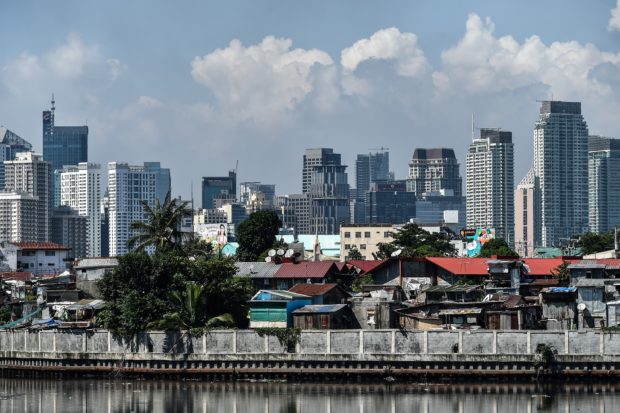PH cautioned against being ‘fooled by resilience’

FILE PHOTO: A general view shows the slum area (foreground) and Makati City (background) in Manila on August 7, 2017. (Photo by MOHD RASFAN / AFP)
Emerging markets like the Philippines may be faring better than advanced economies like those in North America and Europe, but they should not be “fooled by resilience” amid growing signs of slowing growth with tougher times ahead, according to Moody’s Analytics.
The financial services firm said in a commentary that since the bandwagon of monetary policy tightening rolled out last March, most emerging market currencies have depreciated by less than those of advanced economies.
At the same time, emerging market stock exchanges have performed even better compared with most stock markets in advanced economies. The Philippines’ bourse, however, is not among these.
“With the exception of the Philippines and Colombia, major EM (emerging market) benchmark indexes saw little decline this year, while Brazil, Chile and India are in the black,” Moody’s Analytics said.
The company also observed that governments in most major emerging economies are flush with foreign currency reserves, as their central banks have accumulated a war chest of dollars since the emerging market crises of the 1990s and early 2000s.
And yet, Moody’s Analytics said that at a time of the US dollar’s ascendancy, foreign exchange market interventions are not “always well-timed”—pointing to the belated attempts by the central banks of Chile and the Philippines to temper the slide in the Chilean and Philippine pesos.
Considering these, Moody’s Analytics said the emerging markets’ outperformance will soon fade as the tightening cycle peaks and rates in the US and other advanced economies push higher.
“This will press down on EM currencies and equities, thinning their lead over advanced-economy assets,” the company said. “Any remaining resilience will evaporate amid a challenging macroeconomic environment.”
Still, Moody’s Analytics said the prospect of a broader emerging markets crisis was—so far—a remote one, with volatility confined to oft-troubled economies Turkey, Lebanon and Argentina.
“Large stocks of liquid reserves and reduced external debt burdens will keep it that way, but any further hiccups in the global economic landscape will reverberate,” it added. —Ronnel W. Domingo
